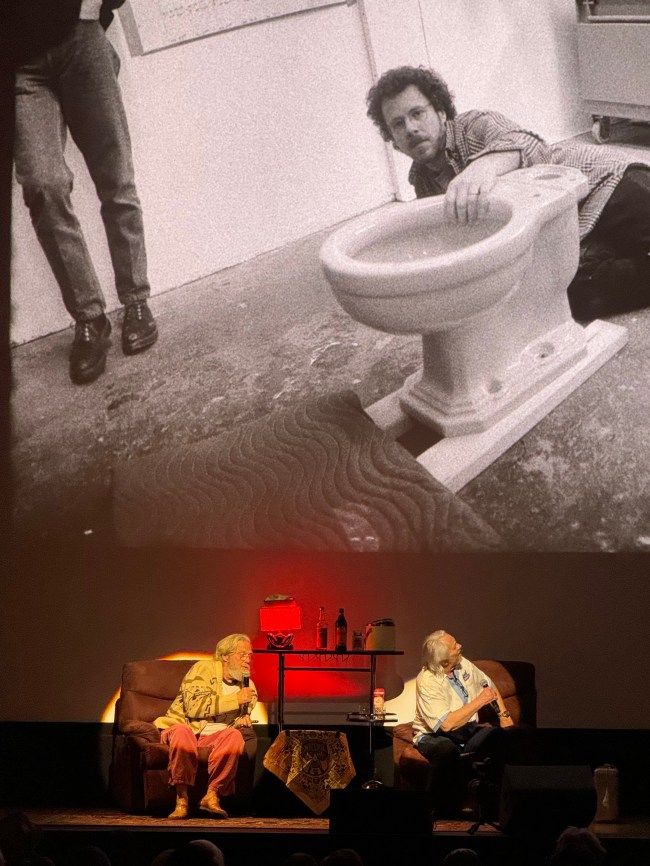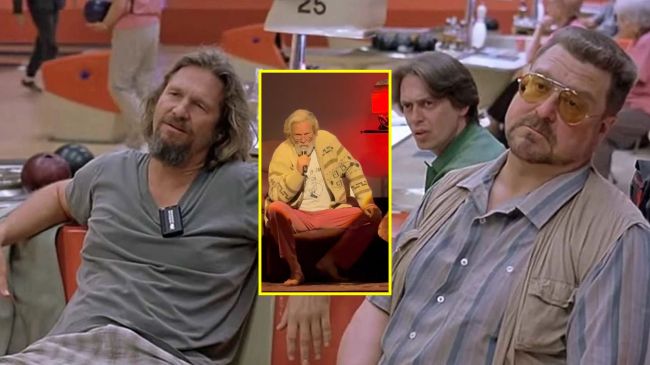via The Big Lebowski
The other night, at a special Big Lebowski screening in the movie’s spiritual home of Los Angeles, Jeff Bridges dropped a theory that kind of blew my mind.
The idea that Donnie isn’t real has been floating around the Internet for a while. The gist is that the ill-fated Donnie—brilliantly played by Steve Buscemi—is just a figment of Walter Sobchak’s imagination, as a lingering trauma response. Some speculate he’s the ghost of fallen brothers from Vietnam, which helps explain why Walter’s always barking at him. “You’re out of your element, Donnie” hits differently when you frame it in Walter’s concern for Donnie vs. an angry outburst, even if not even there.
It’s one thing to read a fan theory on Reddit. It’s another to hear Jeff Bridges unpack it live, like it’s just something he’s been casually chewing on for years, as The Big Lebowski keeps aging like White Russian-soaked folklore, somehow getting deeper, weirder, and more beloved by Little Achievers like myself every year.
Bridges basically riffed that Donnie never really interacts with The Dude, outside of one sarcastic “Thank you, Donnie” to needle Walter. Think of Donnie saying, “Phone’s ringing, dude,” or “I am the Walrus?” without much of an acknowledgment, except Walter’s, “Shut up, Donnie,” bark. Or the observation that other bowling teams seem to only have two men. And that the Stranger’s line at the end about Donnie’s death, according to Bridges at least, doesn’t contradict the theory because, in his words, “The Stranger lives outside space and time.”
Then he spun this head canon where The Dude, offscreen, gives the mortician $50 to help Walter say goodbye to a ghost. A final sendoff for a trauma-buddy who never existed. It’s weirdly sweet.
Here’s what Bridges had to say on the theory:
“Yeah, he’s a figment of Walter’s imagination… And the last few times I’ve seen the movie, I’ve run that theme—and it kind of works, man. Because the Dude never—only one time does he ever acknowledge Donnie. Just a ‘Thank you, Donnie.’
But that’s only to bust Walter’s balls. He knows his friend has this hallucination… this PTSD buddy, and he loves his friend.
Every once in a while, he’s gotta let him in.
There’s even a scene I imagine, where the Dude goes back to the mortician without Walter. He says, ‘Look, I got a friend who’s mentally challenged. He’s about to put this ghost in his mind to rest. I’ll give you 50 bucks, just play along.’
The ashes, the Folgers can, the Stranger saying he’s sorry about Donnie—even that fits. Because the Stranger lives outside time. He can’t be talking about Vietnam.
So next time you watch it, run that scenario. It checks out, man.”
Personally, I love this theory. Walter’s experience in Vietnam is the most defining part of his character, yet we never actually learn what happened over there. He calls himself a “conscientious objector,” which only adds to the mystery. Was Walter actually the conscientious objector shipped off to ‘Nam? And when Donnie’s ashes blow back into the Dude’s face, it feels like Walter’s the one finally letting go. The ritual is less about mourning his friend and more about exorcising something he’s been carrying for decades.
I posted a video of Jeff Bridges talking about this theory at an April 2025 Big Lebowski screening in Los Angeles. You can watch it on my Instagram or check it out below.
The other Big Lebowski theory about Donnie.
It’s not the first time we’ve covered wild Steve Buscemi theories. Earlier this year, we resurfaced the one where his characters in Billy Madison, Con Air, and The Big Lebowski are all the same guy on a chaotic redemption arc (and possibly a serial killer, as rationalized by the fact he has a different name on his bowling shirt in every scene).
The theory goes like this: after crossing Billy Madison off his “People to Kill” list, Buscemi’s Danny McGrath descends fully into madness, winds up incarcerated as Garland Greene in Con Air, escapes the plane in Vegas, and disappears into Los Angeles under a new identity. There, he joins a bowling league, lays low, and tries to blend in as “Donnie.” The new names on his shirts are keepsakes from victims, or aliases from past lives, depending how dark you want to go.
In that theory, Donnie is hiding in plain sight in Southern California. He’s the Zodiac with good form on the lanes.
It sounds insane, but in a way that fits the Lebowski universe perfectly.
So is Donnie real or what, man?
The theory that Donnie isn’t real and just a figment of Walter’s imagination, though, hits a little differently. It actually re-frames the movie’s emotional core: Walter’s grief over his experience in Vietnam, the fragility of friendship, the heart attack, the whole ashes-in-the-face moment.
For what it’s worth, the Coen brothers have already weighed in on the Donnie theory. They dismissed it pretty definitively.
During a 2016 interview with The Huffington Post while promoting Hail, Caesar!, Ethan Coen said, “Really? No, I haven’t heard that. But doesn’t The Dude get covered by Donny’s ashes at the end of the movie?” Joel jumped in with, “So what’s in the urn?” When the interviewer pushed the idea that The Dude might just be playing along with Walter’s delusion, the brothers weren’t having it. “You could say any of the characters are imaginary if you wanna stretch it that far,” Ethan laughed. Joel added, “All the characters are imaginary. They were all imagined. They don’t exist in reality. They were just made up for the movie.”
Maybe none of this holds up, and the idea that Donnie isn’t real is not officially canon under close inspection, at least to the movie’s original authors?
But that’s what makes it fun. It’s a giant… “hmmm… maybe, man.”
People in the comments had a lot to say:
Some pointed out hard-to-ignore counter-evidence:
- “What about when The Dude literally runs to Donnie during the heart attack?”
- “He acknowledges Donnie in the first scene. ‘My rug, Donnie.’”
- “They both acknowledge Donnie during the fight with the nihilists.”
- “Jesus Quintana blows Donnie a kiss during his slow-motion entrance.”
- “The bartender at the bowling alley says, ‘Sorry about Donnie,’ directly to The Dude.”
- “Donnie literally speaks to The Dude about his phone ringing and The Dude responds.”
- “Donnie asks about the rug, The Dude answers. There’s more than one beat.”
- “You can’t get the ashes of someone’s imagination all over your face, dude.”
More Big Lebowski theories
Some comments went even deeper, with more Big Lebowski theories:
One person argued that Donnie is the audience surrogate. He’s a soft-spoken blank slate who mostly just listens, reacts with confusion, and prompts Walter’s unhinged tangents. He’s our avatar in the movie. The one who doesn’t get it. And when he dies, the narrative snaps back into focus and we’re reminded we’ve been watching a memento mori all along.
Another theory said that The Dude, Walter, and Donnie aren’t three people at all, but three parts of a fractured whole. Donnie is the part that needed to die so The Dude could evolve. The internal monologue is externalized. A stoner id, an authoritarian superego, and a pacifist ego fumbling through a complicated world that doesn’t make sense.
There’s also a riff that connects The Big Lebowski to Season 2 of Fargo, interpreting the bowling alley as purgatory and The Stranger as a kind of cosmic gatekeeper. In that reading, Donnie’s death is a spiritual one. A release. Another theory frames the movie as a Western, with The Dude as a slacker-era Wyatt Earp, wandering through a modern frontier in sandals and a bathrobe.
Another person offered a counter to the Con-Air theory that backs up the idea that Donnie is a figment of Walter’s imagination: the reason Donnie wears random names isn’t because he’s hiding. It’s because he’s not real. He’s not one person. He’s every person. A floating idea in Walter’s head who can be anyone the league needs him to be.
One fan zoomed even further out, assigning each major character to a decade. The Big Lebowski and Jackie Treehorn are the stuck-up superficiality of the 1950s. The Dude and Walter are the 60s. Maude and Bunny are the 80s. The nihilists are definitely the 90s. Donnie represents the 70s, and like the 70s, he’s kind of… not really there? Present but irrelevant. A transitional ghost between cultural movements.

via Brandon Wenerd
There was even someone who suggested Walter never served in Vietnam at all. That it’s a lie he’s been telling himself (and everyone else) for so long he believes it. Which turns the film into a story about two guys managing their separate delusions: The Dude’s passivity, Walter’s stolen valor, while trying to keep it together just long enough to finish his true love, bowling league play.
And finally, a surprisingly thoughtful (and slightly heartbreaking) interpretation: that the mortuary scene isn’t about Donnie at all, but about Walter. This is more or less what Jeff Bridges was getting at: The Dude plays along because the ritual of saying goodbye is important to Walter’s healing process. Not because Donnie wasn’t real, but because complicated emotions like grief or mental illness don’t have to be rational to be real to someone.
PTSD, like finding the rug that tied the room together, is complicated, man.
Also, shoutout to the person who said, “No way The Dude had $50.” Valid critique. Probably blew it all on Kahlua and new Creedence tapes.
The only way to know if it holds up is a rewatch
That’s the beauty of The Big Lebowski, though. It’s a movie that feels simple, but somehow keeps unfolding, like this whole darn human comedy keeps perpetuating itself.
Some criticize The Big Lebowski for having a flimsy plot, but the so-called “puttering out” is the entire damn point. The rich people’s nonsense collapses under its own weight because they were never the story to begin with. They’re just noise. Background tension between two very different, stratified versions of life in Los Angeles. The Dude and Walter are California’s stoner Don Quixote and his war-weary Sancho. They’re not chasing meaning through money or ambition; they find purpose just by bouncing off each other. They keep each other grounded, with no agenda and no expectation of reward. That’s beautiful, man. That’s real friendship.
The stakes here are human: loyalty, absurdity, a little adventure to build lore and laugh about later, and the quiet dignity of showing up for your friends. The Dude, Walter, and Donnie don’t need a payoff or a hero arc, but they do need bowling and each other. While the rest of Los Angeles is chasing vanity and money, they’ve got their simple vices, league night, and just enough LA mystery to bond over. It’s not flashy, but it’s enough to keep rolling. That’s deeply humanist. That’s the art.
And the fun thing about Lebowski theories is that they don’t kill the fun of watching it. If anything, it makes the rewatch more interesting.
Someone in the comments said, “I’ve watched this movie literally over 3,000 times. It was the only thing on my Xbox hard drive.”
Another person said they used to watch it every single night to go to sleep, like a bedtime story.
That’s dedication. That man has earned the right to say “the theory doesn’t hold up.” But you know what he said right after?
“I still want to watch it again.”
Same.
Because new sh*t has come to light, man.
Content shared from brobible.com.

